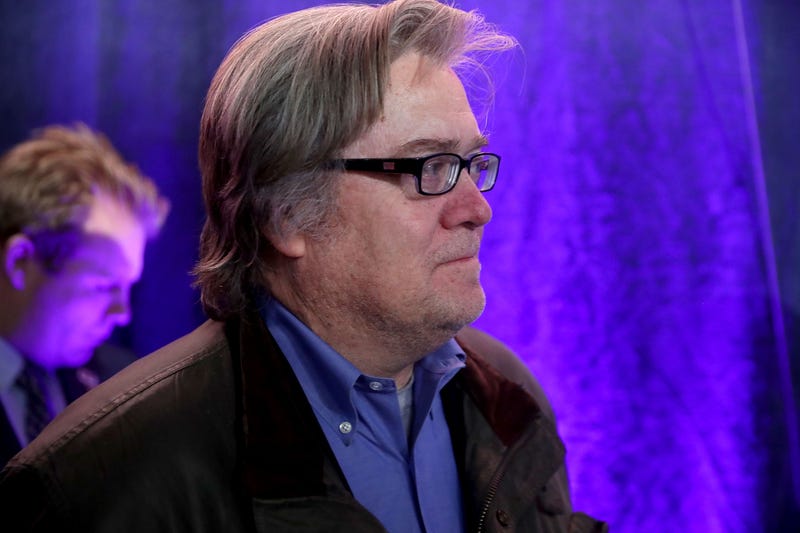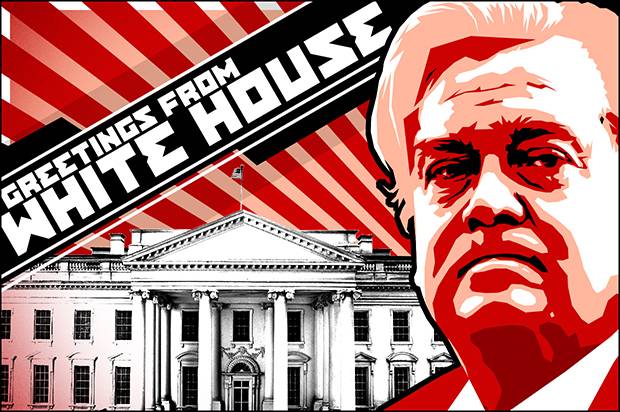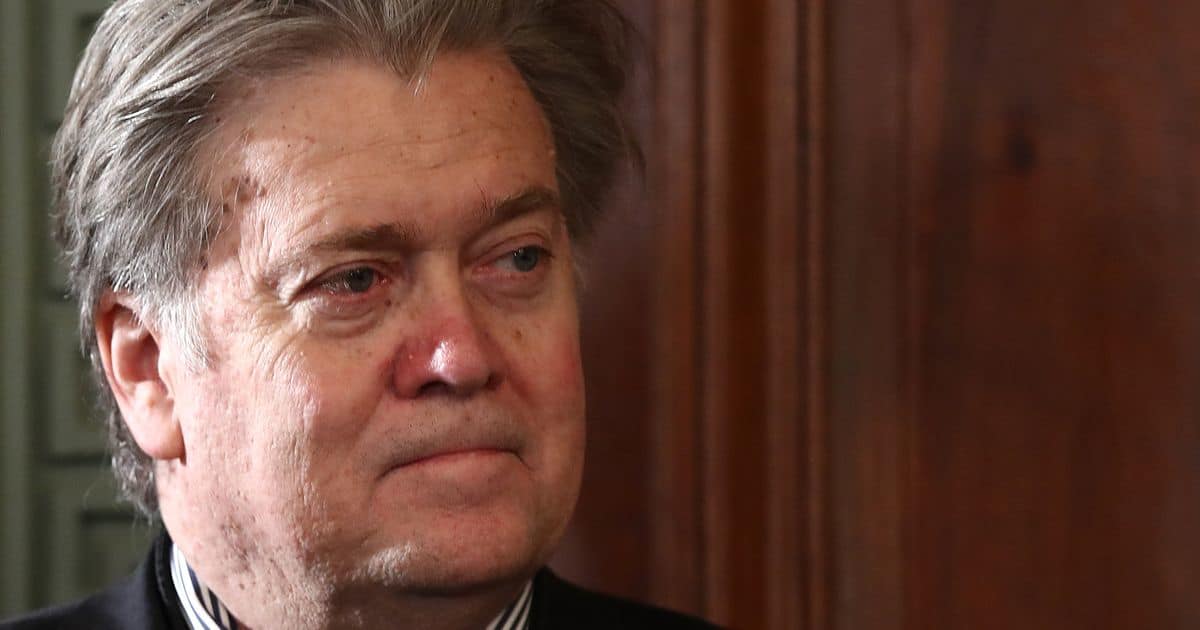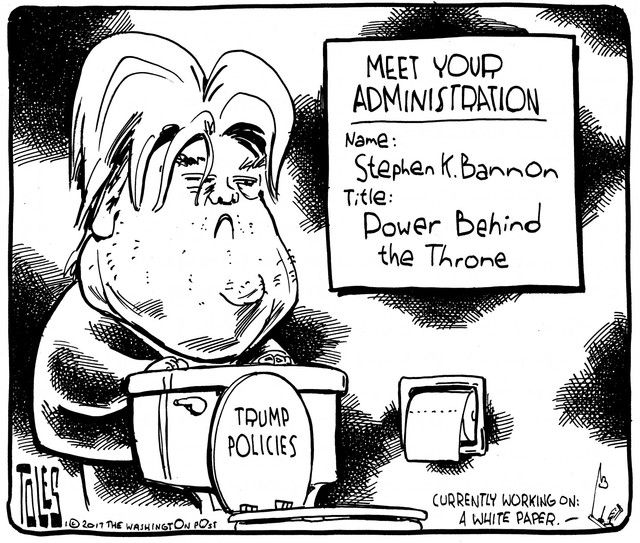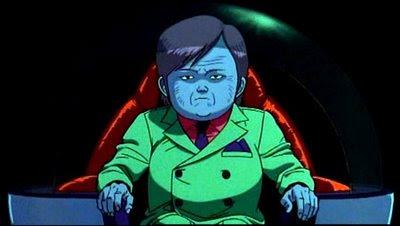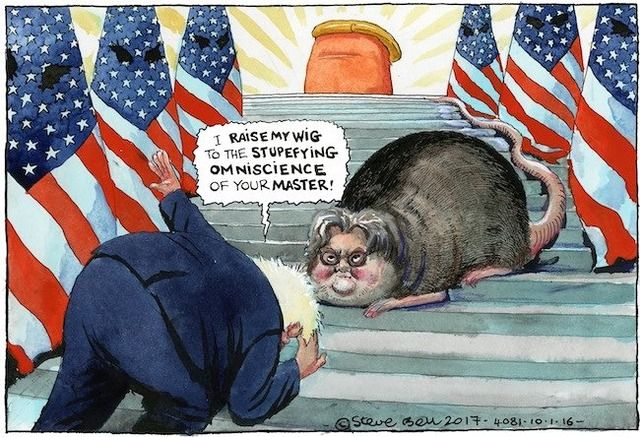The Festering Darkness That is Steve Bannon
I realize his most newsworthy dark deeds will probably be noted in a Trump thread or elsewhere as events occur. But I thought it might be a good idea to have a separate thread just for Bannon. There has always been something disturbing about him and he certainly has done his best to facilitate that image:
But beyond this PR campaign to paint himself as the devil on Trump's shoulder, this weekend revealed a reality that might well prove to be even darker than the facade. First, there was Bannon's decision to override DHS to extend the Muslim travel ban to green card holders. Second, there is his ascent to the NSC:
From my perspective, this will take the NSC back to Iran/contra level skullduggery. If Bannon is as buddy-buddy with Flynn as he looks in the photo above, perhaps the outlines of a new Secret Team are emerging. When I first wrote about Trumpstag, I certainly didn't envision it being something exclusively within Executive Branch control. Now I'm not so sure.
Steve Bannon: ‘Dick Cheney. Darth Vader. Satan. That’s Power’
Angela Bronner Helm
11/19/16 11:50am
Donald Trump’s campaign CEO Steve Bannon holds a campaign rally at the Reno-Sparks Convention Center on Nov. 5, 2016, in Reno, Nev.
Chip Somodevilla/Getty Images
Steve Bannon has used his Harvard Business School-honed skills to promote a reality-show entertainer all the way to the presidency, using fear, half-truths, xenophobia and racism.
Now that the mask is off, Bannon gave his first official interview to the Hollywood Reporter after being named chief strategist in the Donald Trump administration, and he did not mince words. Perhaps this is why white supremacists rejoiced at his appointment.
Bannon actually said: “Darkness is good. Dick Cheney. Darth Vader. Satan. That’s power. It only helps us when they [liberals] get it wrong. When they’re blind to who we are and what we’re doing” (emphasis ours).
Bannon also denied being a white nationalist but said that he does, in fact, have a plan—one that will last at least 50 years in his mind.
“I’m not a white nationalist,” he said. “I’m a nationalist. I'm an economic nationalist. The globalists gutted the American working class and created a middle class in Asia. The issue now is about Americans looking to not get [f—ked] over. If [Trump is successful] we’ll get 60 percent of the white vote and 40 percent of the black and Hispanic vote, and we’ll govern for 50 years. That’s what the Democrats missed. They were talking to these people with companies with a $9 billion market cap employing nine people. It's not reality. They lost sight of what the world is about.”
In the interview, Bannon also referenced notorious racist Andrew Jackson’s “populism” and said that Trump was one of America’s greatest orators. (Side note: Don’t great orators have to use more than seven keywords? In Trump’s case—“great,” “incredible,” “huge,” “amazing,” “America,” “wall,” “immigrant”?)
“You have probably the greatest orator since William Jennings Bryan, coupled with an economic populist message and two political parties that are so owned by the donors that they don't speak to their audience,” he continued. “But he speaks in a nonpolitical vernacular, he communicates with these people in a very visceral way. Nobody in the Democratic Party listened to his speeches, so they had no idea he was delivering such a compelling and powerful economic message. He shows up 3.5 hours late in Michigan at 1 in the morning and has 35,000 people waiting in the cold. When they got [Clinton] off the donor circuit, she went to Temple University and they drew 300 or 400 kids.”
Bannon’s appointment to Trump’s incoming administration is opposed by a number of groups, including the Southern Poverty Law Center, the Anti-Defamation League, the Council on Islamic-American Relations, People for the American Way and others.
But beyond this PR campaign to paint himself as the devil on Trump's shoulder, this weekend revealed a reality that might well prove to be even darker than the facade. First, there was Bannon's decision to override DHS to extend the Muslim travel ban to green card holders. Second, there is his ascent to the NSC:
With National Security Council Shakeup, Steve Bannon Gets A Seat At The Table
January 29, 20171:40 PM ET
White House senior advisers Jared Kushner (from left), Steve Bannon and national security adviser Michael Flynn are seen in the Oval Office of the White House in Washington on Friday.
Pablo Martinez Monsivais/AP
President Trump has reorganized the National Security Council by elevating his chief strategist, Steve Bannon, and demoting the director of National Intelligence and the chairman of the Joint Chiefs of Staff.
Bannon will join the NSC's principals committee, the top interagency group for discussing national security. The National Security Council is the staff inside the White House that coordinates decision-making by the president on such matters, in coordination with outside departments including the State Department and the Pentagon.
It's an unusual decision, NPR's Mara Liasson reports. "David Axelrod, for instance, who had a similar job as Bannon in the Obama administration, never sat in on principals meetings," she added. When such figures seen as part of the political wing of the White House have participated in broader National Security Council meetings, it has sparked sharp criticism from the national security establishment.
Former White House Chief of Staff Josh Bolten said last year that President George W. Bush instructed his top political adviser, Karl Rove, never to appear at a National Security Council meeting.
It wasn't that Bush didn't value Rove's counsel, Bolten said — clearly he did.
"But the president also knew that the signal he wanted to send to the rest of his administration, the signal he wanted to send to the public, and the signal he especially wanted to send to the military, is that, 'The decisions I'm making that involve life and death for the people in uniform will not be tainted by any political decisions,' " Bolten remembered.
Before joining Trump's inner circle during the 2016 campaign, Bannon was the head of Breitbart News, a far-right media outlet that has promoted conspiracy theories and is a platform for the alt-right movement, which espouses white nationalism.
Bannon was extremely influential during the first week of the administration — he is said to be part of a small group inside the White House driving the flurry of executive actions this week, Mara has reported.
Some of those orders have provoked criticism that Bannon and other administration officials are not coordinating with other agencies on major policy changes, Mara says, such as the chaos and detentions at airports following Trump's executive order on immigration.
The NSC principals committee is defined as "the Cabinet-level senior interagency forum for considering policy issues that affect the national security interests of the United States." It's chaired either by national security adviser Michael Flynn or homeland security adviser Tom Bossert and now includes the secretaries of state, defense and the Treasury, plus the attorney general, White House chief of staff and the president's chief strategist, which is Bannon's position.
On the other hand, the director of National Intelligence and the chairman of the Joint Chiefs of Staff will now attend Principals Committee meetings only when "issues pertaining to their responsibilities and expertise are to be discussed," according to the presidential memorandum issued on Saturday.
As NPR national security editor Philip Ewing explains, Trump "is shaking up the wonky process by which the executive branch makes its toughest decisions on national security — the big question is how much that will matter." Here's more:
"On paper, these are big changes: Past administrations ran their National Security Councils with a Great Wall of China-separation between the political team at the White House and the nonpartisan specialists who help with decision-making. The explicit inclusion of Bannon means that Trump's top adviser on messaging, strategy and other partisan issues means he could also be part of decisions about policy toward adversaries, military actions and other such decisions.
"What does it all mean, in practical terms? It's too soon to say. Former national security council staffers say their day-to-day meetings and process were not governed by whatever formal instruction issued by their respective presidents. Political staffers from the White House have attended meetings in the past. The committees invite who they think they need to invite given the topics under discussion — something that will likely continue under [national security adviser Michael] Flynn."
Attorney John Bellinger, who served on the National Security Council during the George W. Bush administration, told NPR's Weekend All Things Considered on Sunday that presidents structure the National Security Council in the ways they think work best for them.
"There's no law against the president taking advice from anyone he wants," Bellinger said.
He also said the headlines about the "demotion" of the Joint Chiefs chairman and the director of national intelligence were overblown. Bellinger said time would tell how the council practically operates under Trump and Flynn, but that some of its dealings legitimately might not need to involve those leaders — when leaders meet to plot their strategy for responding to a hurricane, for example.
Top security officials from the Obama administration are blasting the decision.
Former Defense Secretary Robert Gates, who served under Obama and George W. Bush, called the demotions a "big mistake" in an interview with ABC News. "I think that they both bring a perspective and judgment and experience to bear that every president, whether they like it or not, finds useful," Gates said.
Former national security adviser Susan Rice called the move "stone cold crazy." In a sarcastic tweet, she said: "Who needs military advice or intel to make policy on ISIL, Syria, Afghanistan, DPRK?"
White House press secretary Sean Spicer responded in an interview with ABC News. "That's clearly inappropriate language from a former ambassador," Spicer said. "We are instilling reforms to make sure that we streamline the process for the president to make decisions on key, important intelligence matters. You've got a leader in Gen. Flynn who understands the intelligence process and the reforms that are needed probably better than anybody else."
Spicer also defended Bannon's qualifications. "Well, he is a former naval officer. He's got a tremendous understanding of the world and the geopolitical landscape that we have now," Spicer said.
Sen. John McCain, chairman of the Armed Services Committee, told CBS News, "I am worried about the National Security Council. Who are the members of it and who are the permanent members? The appointment of Mr. Bannon is something which is a radical departure from any National Security Council in history."
McCain added that, "One person who is indispensable would be the chairman of the Joint Chiefs of Staff, in my view."
From my perspective, this will take the NSC back to Iran/contra level skullduggery. If Bannon is as buddy-buddy with Flynn as he looks in the photo above, perhaps the outlines of a new Secret Team are emerging. When I first wrote about Trumpstag, I certainly didn't envision it being something exclusively within Executive Branch control. Now I'm not so sure.
